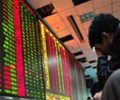Asian shares join rally on Wall Street, gold hits record high amid trade jitters

Stocks rallied across much of Asia on Thursday, with the chip sector gaining following a strong rally among U.S. stocks overnight and a strong start to Wall Street’s earnings season also lifting sentiment.
At the same time, escalating trade disputes between Beijing and Washington increased the appeal of safe haven assets such as gold – which hit record highs – and weakened the dollar.
Crude rose from a five-month low after US President Donald Trump said Indian Prime Minister Narendra Modi had promised his country would stop buying oil from Russia, which supplies about a third of its imports.
Japan’s Nikkei rose 1.2%, with chip and artificial intelligence-related stocks boosting the index.
The momentum picked up after Taiwanese chipmaker TSMC reported record earnings, and also benefited from political developments that put Sanae Takaichi’s bid to become Japan’s prime minister back on track.
Trading on Taiwan stock TWSE:TAIEX had already closed at the time of TSMC’s announcement, ending the day up 1.4% and hitting a record.
South Korea’s KOSPI jumped 2.2% to a record peak after the country’s chief presidential policy adviser said he was “optimistic” about ongoing talks to finalize a trade agreement with the US.
Australia’s equity benchmark (.ASJO) added 0.9% and also hit a record high as poor jobs data raised the possibility of central bank easing.
However, Hong Kong’s Hang Seng fell 0.7% and mainland China’s blue chips were flat in a volatile session as investors weighed the path of trade relations with the US.
European stock futures pointed 0.3% lower.
U.S. stock futures were flat overall following a 0.4% rise in the S&P 500 and a 0.6% rise in the tech-heavy Nasdaq overnight. The Philadelphia SE Semiconductor Index jumped 3%.
“I remain confident that the long-term path of least resistance will continue to point to the upside” for equities, said Michael Brown, senior research strategist at Pepperstone.
“Despite the choppy conditions, I would argue strongly that this is one of those moments where intraday price action largely represents noise.”
GOLD SURGE CONTINUES, DOLLAR DECLINES
Optimism about the AI narrative and signs of economic strength from strong US banking earnings stole the attention of stock investors, even as Trump announced late Wednesday that the US was in a “trade war with China” – confirming what markets had concluded from recent comments from both sides.
Gold rose as much as 0.8% in the last session to reach an unprecedented $4,241.77 per ounce.
The dollar slumped for a third straight session, down 0.1% against a basket of major currencies.
The pair slipped as much as 0.4% to 150.51 yen, putting the key psychological 150 line in brief focus, although it bounced back to flat ahead of the European market open.
Part of the setback came following news that the leader of the ruling Liberal Democratic Party, Takaichi, was in talks with one of the opposition parties – the right-leaning Japan Innovation Party – to forge a partnership aimed at getting enough votes in parliament to win the prime minister’s post in a vote likely to take place next week.
The euro added 0.1% to $1.1657, and sterling rose 0.1% to $1.3412.
There were some hopeful signs of easing trade tensions, with US Treasury Secretary Scott Bessent saying an extension of the current tariff suspension was possible, and that Trump was still expected to meet Chinese leader Xi Jinping in South Korea later this month.
“The dispute between the US and China has not gone away,” said Kyle Rodda, senior financial markets analyst at Capital.com.
“This will only subside completely when China drops its threat of curbing rare earths exports and the US cancels the tariff increase to 100% scheduled for November 1. Until then, doubts will remain in the market.”
Trump’s trade maneuvers also lifted oil prices from five-month lows, with Brent crude futures rising 0.8% to $62.41 a barrel and U.S. West Texas Intermediate (WTI) crude futures rising 0.9% and trading at $58.77.
On Wednesday, the US president said India would stop buying oil from its main supplier, Russia, and Washington will next try to get China to do the same as it intensifies efforts to cut Moscow’s energy revenues and pressure it to negotiate a peace deal in Ukraine.
Source: Reuters
